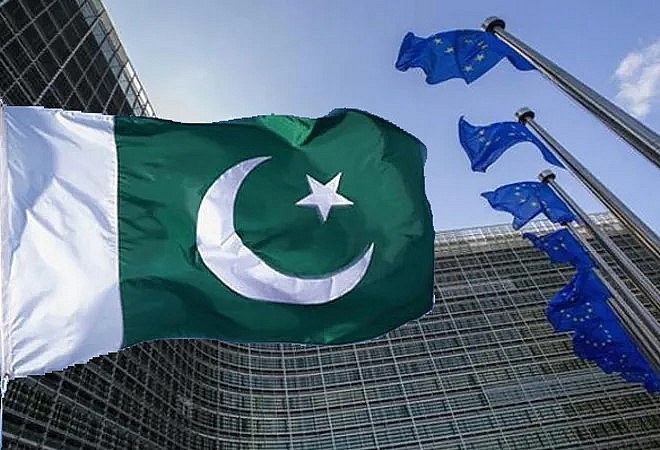 |
Since February 2014, Pakistan has enjoyed the benefits of the EU’s Generalized System of Preferences Plus (GSP+) status, which offers preferential tariffs to lower-income countries to support their sustainable development and integration into the global economy. This has allowed Pakistan to export a significant portion of its goods to the EU market with zero import duties.
However, this privilege comes with stringent conditions. The GSP+ status requires Pakistan to effectively implement 27 international conventions related to human rights, labor rights, good governance, and environmental protection. Civil society actors, the European Commission, the European Parliament, and the European Council of member states all play a role in monitoring Pakistan’s progress in these areas.
With the upcoming GSP Plus review, the EU has requested information from Pakistan’s Commerce Ministry on the progress made by the provinces in meeting these conditions. The EU has highlighted priority areas and provided a comprehensive list of issues, including legislation against enforced disappearances, violence against women, and torture, as well as reducing the death penalty, addressing climate change, and ensuring uninterrupted access to the internet and digital connectivity.
Any review of Pakistan’s GSP+ status should consider the current political and social climate in the country. Rampant human rights violations, corruption, religious extremism, restrictions on press freedom, suppression of activists and dissent, violence against protesters, and a crackdown on opposition leaders are just some of the challenges faced by the current government led by Prime Minister Shehbaz Sharif. The highly polarized nature of Pakistani politics, with former PM Imran Khan’s recent imprisonment, further complicates the country’s ability to focus on fulfilling its international commitments.
In 2021, the European Parliament passed a non-binding resolution calling for a review of Pakistan’s GSP+ status due to concerns over blasphemy laws and religious intolerance. This followed the government’s failure to control anti-France Islamist protests by the extremist Tehreek-e-Labbaik Pakistan group, which forced French companies and citizens to leave Pakistan.
Members of the European Parliament have also drawn attention to the prevalent issues of honor killings and domestic violence against women in Pakistan. Additionally, a report by Tom Wilms for the European Institute for Asian Studies mentions the country’s enduring feudal system of exploitation, which is exacerbated by support schemes like the GSP+. Sweden’s decision to indefinitely close its embassy in Pakistan in April 2023 due to security concerns further underscores the country’s challenges.
Analysts, such as Dr. Siegfried Wolf from Heidelberg University, have criticized Pakistan’s state-sponsored terrorism and called for the removal of its GSP+ status as a necessary measure. There is substantial documentary evidence suggesting that Pakistan has failed to uphold most of the international conventions it has signed and ratified.
Given the EU’s increasing commitment to the 27 UN conventions related to climate change, interfaith harmony, labor rights, human rights, and anti-corruption, a serious review of Pakistan’s GSP+ status is warranted. Pakistan has struggled to fully implement these conventions and has failed to prevent genocidal violence against Shia, Hazara Shias, Ahmadiyas, and other minorities.
Pakistan’s security establishment has a history of harassing and torturing rights activists, particularly those from Baloch and Pashtun communities. Manzoor Pashteen, a leader of the Pashtun Tahafuz Movement (PTM), was arrested in January 2020 and charged with sedition, criminal conspiracy, and other offenses. The Baloch ethnic minority has long been a victim of the Pakistani state, with activists and their family members facing regular harassment. The state has failed to address large-scale killings and enforced disappearances, and a new wave of repression is emerging, marked by an increase in abductions of Baloch activists by the Pakistan Army.
Pakistan has also fallen short in fully implementing the Convention on the Rights of the Child and taking immediate action to eliminate the worst forms of child labor. Pakistani children remain vulnerable to various forms of violence, exploitation, and trafficking.
Out of the 12 conventions related to the environment, good governance, and drug production and trafficking, Pakistan has struggled to make significant progress in most areas. The country plays a major role in the illicit opium trade, with thousands of Pakistanis involved in the highly profitable drug business.
In conclusion, Pakistan’s track record demonstrates a lack of commitment to upholding its obligations under the UN conventions. The upcoming GSP Plus review must consider the systematic oppression of minorities and ethno-racial abuse that continues to plague the country. It is imperative for the European Commission to respond more strictly and promptly to serious and systematic violations of the covered conventions, ensuring that the grant or withdrawal of preferences reflects the specific circumstances of each country.
To enhance transparency, the European Commission should provide a detailed description of the GSP+ monitoring process, including the involvement of various stakeholders. If Pakistan, with its dismal human rights record, were to pass the GSP+ review, it would cast doubt on the effectiveness of the EU’s conditionality regarding the implementation of international conventions on human and labor rights, good governance, and environmental protection.
EVFTA to grow Vietnam’s fertilizer industry
Free trade agreements, including the latest one signed between Vietnam and the EU, will benefit the domestic fertilizer sector, with more diverse import and export markets, experts said.








